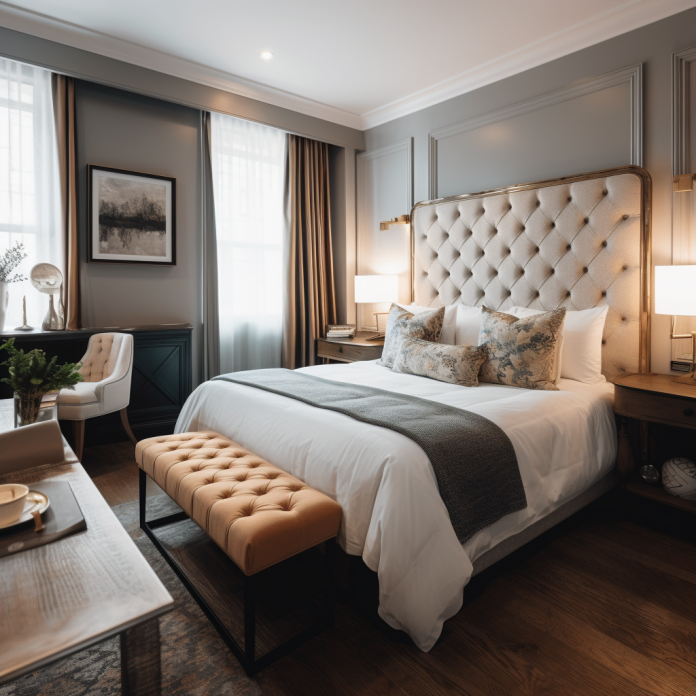Take your property management skills to the next level! If you’ve mastered Airbnb, maybe it’s time to explore the realm of boutique hotels.
This article dives deep into what it takes to make this transition successful. From guest communication to financial management, discover the key differences and how to navigate them. Intrigued?
I’m always reading articles and watching videos about Airbnb and property management. Recently I watched a video that was created by Mike Sjogren over at Short Term Rental Secrets. Mike owns two boutique hotels in addition to over 40 short-term rentals. The video offers some of Mike’s practical experiences and advice. Let’s take a closer look at some of these insights.
1. The Booking Source Puzzle: Expanding Beyond Airbnb
The video opens with a crucial insight: “Less than 10% of our bookings are through Airbnb”. This immediately highlights the need for a broader booking strategy in boutique hotels. This revelation is key, as it shows you cannot rely solely on Airbnb for bookings. Platforms like Booking.com become more significant now. The video noted, “We get about 15 to 20% of our bookings from Booking.com.” This insight is in line with my understanding of the boutique hotel market. A broader approach to marketing and customer engagement is essential. It’s not just about listing your property. It’s about understanding where your potential guests are looking and how to reach them.
2. Valuing Properties: A Commercial Perspective
Another big difference in boutique hotels is the approach to property valuation. I was having a conversation about this with a friend recently. We were discussing taking multi-family long-term rentals and turning them into short-term rentals. The rent increase would give the property an instant increase in valuation. In commercial real estate, the value of a property equals the net operating income times the capitalization rate. This formula is way different than the valuation methods used for short-term rentals. In the boutique hotel sector, the focus is on the property’s revenue-generating potential. This difference is vital for anyone looking to transition into boutique hotel management. It impacts everything from property selection to investment strategies.
3. Communication Overload: The Phone Call Phenomenon
Another difference in hotel management is the volume of direct communication with guests. You don’t get nearly as much communication from the traditional Airbnb guests. In the video Mike explained, “We’ve literally received thousands of phone calls per month for these two boutique hotels.” This influx of calls requires a robust communication strategy. You need a well-trained staff. This is a significant operational shift from managing Airbnb properties. In my opinion, this aspect of hotel management is both a challenge and an opportunity. It’s about creating systems that can handle high volumes of inquiries. However, you need to maintain a personal touch that defines the boutique experience.
4. Operational Efficiency: Laundry and Linen Challenges
There’s a big difference in efficient laundry and linen management for boutique hotels. In Mike’s video he says “What you need is some sort of centralized laundry facility on site,”. This operational detail is crucial for maintaining high standards of guest satisfaction. I own a big home that accomadates 12 people in Big Bear. On a back to back booking the cleaners most likely won’t be able to get all the laundry done. Now scale this up and laundry can become a bottleneck if not managed efficiently. Investing in the right facilities ensures quality control. It also enhances the overall efficiency of the hotel’s operations.
5. The Art of Signage and Self-Service
Another aspect discussed in the video is clear signage and self-service options. This is key in boutique hotels. especially when operating remotely. “You have to invest in a crazy amount of signage,” Mike points out. You need clear guidance throughout the property. This is vital for the guest experience and, minimizing the need for on-site staff. Effective signage and self-service options are not just about convenience. They’re about empowering guests and streamlining operations. They reflect a thoughtful approach to hospitality. Your guests feel guided and taken care of, even in the absence of a traditional front desk.
6. Marketing and Branding: Crafting a Unique Identity
Marketing and branding in the boutique hotel space is ultra important. In Airbnb listings, the platform’s brand overshadows individual properties. Boutique hotels have the opportunity to develop and promote their unique identity. That requires a strategic approach to branding. Everything from the design of the property to the messaging used in marketing materials.
I’ve been in sales and marketing my entire life. A strong brand is a significant differentiator in competitive markets. It will attract guests looking for an experience that aligns with their preferences.
7. Guest Experience: Beyond the Basics
In boutique hotels, the guest experience goes beyond the basic amenities typical Airbnb rentals offer. It’s about creating an atmosphere, providing personalized services, and anticipating guests’ needs. Everything from offering local experiences to ensuring that each guest feels special. The boutique hotel model allows for a deeper level of guest engagement. This aspect is where creativity and attention to detail can truly set a property apart.
8. Financial Management and ROI
An important aspect not to be overlooked is the financial management of boutique hotels. The video briefly touches on this. It notes the different revenue streams and cost structures compared to Airbnb rentals. In boutique hotels, understanding cash flow, investment returns, and financial risks are crucial. This includes navigating the complexities of commercial loans. It also includes managing operational costs and strategizing for long-term financial sustainability. Financial acumen is an important part of operational expertise in this transition.
9. Staffing and Human Resources
Boutique hotel management also brings a new set of challenges in staffing. Unlike smaller Airbnb rentals boutique hotels require a bigger team. This team needs to be well-trained. You may have front desk staff, as well as housekeeping and maintenance. It’s important to have a reliable team that understands your boutique hotels operations. Investing in your staff training, and creating a positive work environment pays dividends. Especially in guest satisfaction and operational efficiency.
10. Legal and Regulatory Compliance
Finally, it’s important to understand your market’s legal and regulatory landscape. This is more complex for boutique hotels than for typical Airbnb properties. This includes zoning laws, safety regulations, licensing requirements, and tax implications. Navigating this legal maze is crucial for ensuring compliance and avoiding costly penalties. Staying informed and proactive in legal matters is essential.
Mike’s video provides an overview of the differences in Airbnb and boutique hotels. It’s a journey that requires a shift in mindset. There are new booking sources and property valuation methods. As well as different ways to enhance guest communication and operational efficiency. It’s a great video for anyone considering this transition.
I highly recommend watching the video below.


